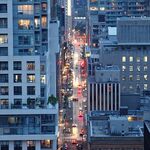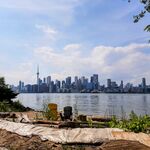He would have been delighted to hear that. Any reasonably attractive male who could pass for 21 gained his immediate attention.
Not sad, really. He was in declining health for a number of years with Parkinsons, and his time had come. He lived at 40 Homewood ( penthouse 7 ) when I first knew him, and then in a co-op at 31 Rosedale Road. Earlier, his parents George ( who chaired the founding convention of the CCF, and was
the authority on Plato ) and Gwenneth lived in another co-op in Rosedale ( I forget where ) and I met them in the late '70s.
And he certainly wasn't a mainstream 'homintern' activist, and knew all kinds of people - gay and straight. When I was a student, he took me to meet Gilbert and Stewart Bagnani at their "baronial hall" in the country, for instance, where we had a nice lunch. Stuart was, essentially, a member of the Family Compact.
http://www.trentu.ca/admin/library/archives/97-003.htm
John was nutty as a fruitcake and told the most wonderful stories - how he was locked up in a "psycho ward" after the brouhaha at the University of Windsor ( before he started teaching at OCA in '71, when I met him ... ), for instance. About growing up in a CCF household with family friends such as Red Emma Goldman. About Quebec politics, which obsessed him and generated a couple of books. You name it, he knew it.
When we weren't much older than you, an art school friend and I helped him start on the novel he'd been trying to write. We decided he'd redo 'Little Red Riding Hood' - though didn't tell him that. We'd mail off instructions about how many words he was to write, and gave him a list of characters to include. He'd mail the chapter back, we'd read it and decide how closely he was to the original story - and mail back more instructions ( which included killing characters off ). Perhaps 'Southern Exposure' still exists in his papers, which he left to the University ( Trinity College, I think ). The whole role reversal aspect of students disciplining teacher appealed to him, and he
did want to write that book, and he took it very seriously - more so than we did.
I could go on ... but won't.




